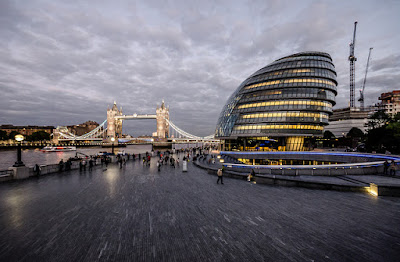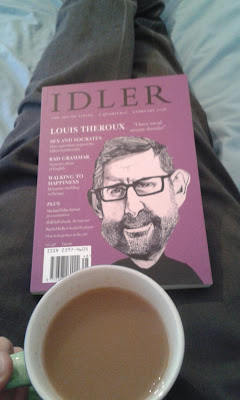Whatever you think about democracy, it tells us more about a nation's people - through how they vote - than any other system of government in use today.
So what do the UK's EU referendum and the US presidential election - the two most significant voting opportunities of 2016 - tell us about the British, the Americans and the western / developed world in general?
The Leave campaign won in the UK, leaning heavily on the slogan 'Take Back Control'. The idea that decisions about the UK should be taken in the UK was
the number one motivation for Leave voters.
Trump won in the US, making similar use of the phrase 'Make America Great Again'. The man himself said that a Trump victory would be "Brexit plus plus plus".
What do both of these campaigns have in common? They leverage a feeling or fear of a loss of control.
Why would British or American people feel they've lost control?
Britain has relinquished an empire and its position as the world's primary manufacturing, military and political power, but most of that happened before most of today's voters were even born.
America, the replacement imperialist, is seeing rising competition from a resurgent China, but it remains the world's dominant superpower and is likely to stay such for decades.
Economic growth in the UK at the time of the referendum was the highest in the G7 group of the world's leading economies, while the US weathered the storm of the 2008 global financial crisis better than probably any other leading economy.
So what's the problem?
Many point to growing inequality, with the
income of the top 1% of earners rising to hundreds of times that of the average earner.
But Americans have decided the best solution for what ails them is to elect a politically inexperienced billionaire with a history of off-shoring jobs from his own companies, while Brits have voted for a course of action that will probably make individuals and the country less well off and leave British companies having to abide by EU rules while no longer having a say in what those rules should be.
Both outcomes demonstrate the victory of easy promises of greater control over reasoned argument. How could this happen?
In the run-up to the UK referendum, the British politician Michael Gove was broadly castigated for having said that "the people of this country have had enough of experts". Even though he actually said
"the people of this country have had enough of experts [from] organisations [with] acronyms saying that they know what is best and getting it consistently wrong", the widely reported and broadly castigated sentiment was correct: people in the UK decided to ignore the advice of economists, business leaders and statesmen and vote for the easy answers.
Likewise, Americans decided to vote not for "
the most experienced presidential candidate in history" but for someone who has never held political office.
In his 1979 book
The Culture of Narcissism: American Life in an Age of Diminishing Expectations, Christopher Lasch quotes Ludwig von Mises as follows:
"Bureaucratic collectivism [...] undermines the "cool rationality and objectivity of capitalist relations" and renders the "plain citizen" dependent on the "professional propagandist of bureaucratisation", who confuses the citizen with his "empty catchwords" and esoteric obfuscation."
In other words, modern bureaucratic society (and what commoner objection is there against the EU than that it's overly bureaucratic?) and its 'experts' have made people dependent and confused.
Lasch goes on:
"Our growing dependence on technologies no one seems to understand or control has given rise to feelings of powerlessness and victimization."
So we're not only dependent and confused, we're also afraid and angry.
And it's not only that we're materially worse off and more dependent:
"Our society tends either to devalue small comforts or else to expect too much of them. Our standards of "creative, meaningful work" are too exalted to survive disappointment. [...] At the same time that our society makes it more and more difficult to find satisfaction in love and work, it surrounds the individual with manufactured fantasies of total gratification. [...] We demand too much of life, too little of ourselves."
Lasch is referring to promises of the absence of physical pain, lavish lifestyles, celebrity and adulation, but it's easy to see parallels with grandiose promises of 'making America great again' and 'taking back control' - or with that so telling phrase of Boris Johnson's: "I'm pro having my cake and pro eating it."
Lasch himself concludes:
"A reassertion of "common sense", according to Mises, will "prevent man from falling prey" to the "illusory fantasies" of professional bureaucrats. But common sense is not enough. In order to break the existing pattern of dependence and put an end to the erosion of competence, citizens will have to take the solution to their problems into their own hands. They will have to create their own "communities of competence."
Lasch was writing in 1979, when free market liberalisation and globalisation were only just being ramped up by Reagan and Thatcher. The problems he wrote about are much bigger today.
But at the same time that globalisation has split developed nations into the haves and have lesses, it's also lifted hundreds of millions of people in developing nations out of genuine poverty, while placing ever greater pressures on the environment.
And it's shown millions of people in Eastern Europe, Mexico, North Africa and the Middle East the kind of lives that people in the west are so desperate to protect, having lucked into them via the lottery of birth.
So while the solution Lasch advocates of greater personal and civic autonomy might well be the right one, we're also going to have to pay even greater heed to another of his points:
"The best hope of emotional maturity, then [...] lies in acceptance of our limits. The world does not exist merely to satisfy our own desires; it is a world in which we can find pleasure and meaning, once we recognise that others too have a right to these goods."








